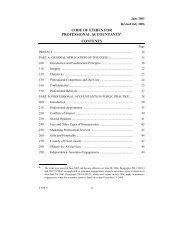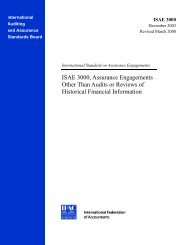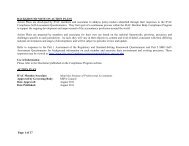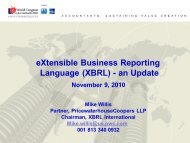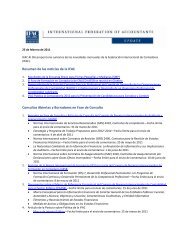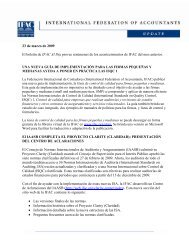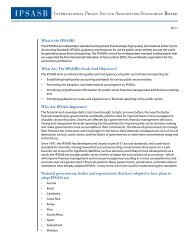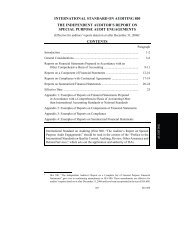ipsas 29—financial instruments: recognition and measurement - IFAC
ipsas 29—financial instruments: recognition and measurement - IFAC
ipsas 29—financial instruments: recognition and measurement - IFAC
Create successful ePaper yourself
Turn your PDF publications into a flip-book with our unique Google optimized e-Paper software.
FINANCIAL INSTRUMENTS: RECOGNITION AND MEASUREMENT<br />
Main pricing-settlement variable<br />
Type of contract<br />
(underlying variable)<br />
(treasury futures)<br />
Currency futures Currency rates<br />
Commodity futures Commodity prices<br />
Interest rate forward linked to government Interest rates<br />
debt (treasury forward)<br />
Currency forward Currency rates<br />
Commodity forward Commodity prices<br />
Equity forward Equity prices (equity <strong>instruments</strong> of another<br />
entity)<br />
The above list provides examples of contracts that normally qualify as derivatives<br />
under IPSAS 29. The list is not exhaustive. Any contract that has an underlying may<br />
be a derivative. Moreover, even if an instrument meets the definition of a derivative<br />
contract, special provisions of IPSAS 29 may apply, for example, if it is a weather<br />
derivative (see IPSAS 29.AG5), a contract to buy or sell a non-financial item such as<br />
commodity (see IPSAS 29.4 <strong>and</strong> IPSAS 29.AG22) or a contract settled in an entity’s<br />
own shares (see IPSAS 28.25–IPSAS 28.29). Therefore, an entity must evaluate the<br />
contract to determine whether the other characteristics of a derivative are present <strong>and</strong><br />
whether special provisions apply.<br />
B.2 Definition of a Derivative: Settlement at a Future Date, Interest Rate Swap<br />
with Net or Gross Settlement<br />
For the purpose of determining whether an interest rate swap is a derivative<br />
financial instrument under IPSAS 29, does it make a difference whether the<br />
parties pay the interest payments to each other (gross settlement) or settle on a<br />
net basis?<br />
No. The definition of a derivative does not depend on gross or net settlement.<br />
To illustrate: Entity ABC enters into an interest rate swap with a counterparty (XYZ)<br />
that requires ABC to pay a fixed rate of 8 percent <strong>and</strong> receive a variable amount<br />
based on three-month LIBOR, reset on a quarterly basis. The fixed <strong>and</strong> variable<br />
amounts are determined based on a CU100 million notional amount. ABC <strong>and</strong> XYZ<br />
do not exchange the notional amount. ABC pays or receives a net cash amount each<br />
quarter based on the difference between 8 percent <strong>and</strong> three-month LIBOR.<br />
Alternatively, settlement may be on a gross basis.<br />
The contract meets the definition of a derivative regardless of whether there is net or<br />
gross settlement because its value changes in response to changes in an underlying<br />
variable (LIBOR), there is no initial net investment, <strong>and</strong> settlements occur at future<br />
dates.<br />
IPSAS 29 IMPLEMENTATION GUIDANCE 1160


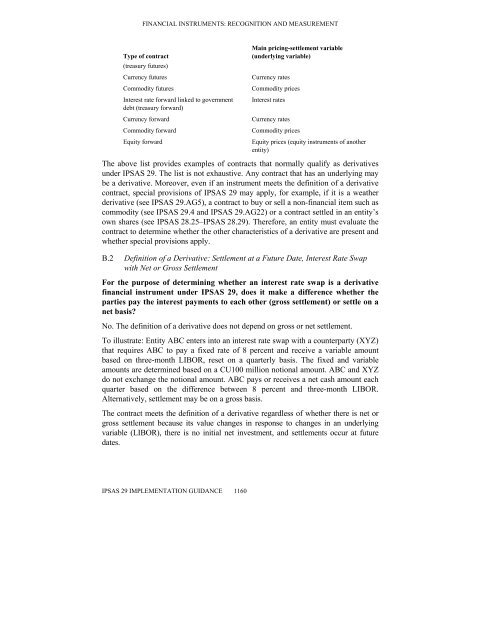
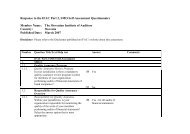
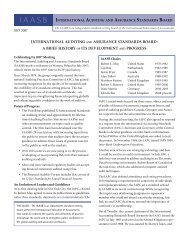
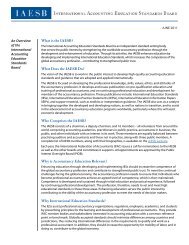
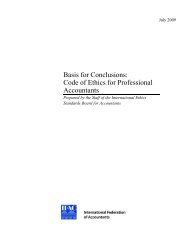
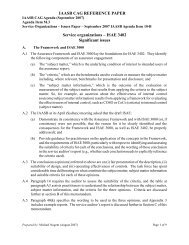
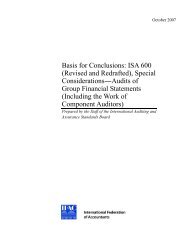
![International Auditing and Assurance Standards Board [IAASB] - IFAC](https://img.yumpu.com/22522144/1/190x245/international-auditing-and-assurance-standards-board-iaasb-ifac.jpg?quality=85)
